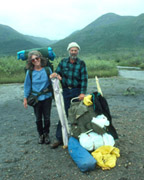Tarpon Spring—Home of Sponges and Greek Food
 Janie Gildart: Welcome to Tarpon Springs, FL
Janie Gildart: Welcome to Tarpon Springs, FL
Last night we joined seven friends for an outing in Tarpon Springs, located about 30 miles north of Tampa-St. Petersburg. There lies the bedrock of the world’s largest sponge industry. Adding to this intriguing come-on is a small street lined with incredible Greek restaurants. The town belongs to a group of Greek people who immigrated here in the early 1900’s to ply their trade of sponge diving and marketing.
One narrow, charming street off the strip-mall highway is where it all happens. The calm harbor on the Gulf of Mexico is a safe haven for a line of beautifully maintained Greek sponge-diving boats.
The street paralleling the harbor and docks is crowded with sponge stores (selling also shells and such items as olive oil soap), a sponge museum—and Greek eateries. Greek music spills into the street and groups of men and women gather to discuss life in their native tongue.
It’s Old World ambience at its best.Shop owners can’t wait to show you the various natural sponges. We found finger sponges, yellow sponges, flower pot sponges, a huge assortment for both decorative and practical uses.
 Harvesting this primitive marine animal is quite a job. The sponge boats travel about eight miles out into the Gulf of Mexico where divers then spend hours selecting the proper sponges to be cut. No sponge smaller than five inches in diameter or height can be taken.
Harvesting this primitive marine animal is quite a job. The sponge boats travel about eight miles out into the Gulf of Mexico where divers then spend hours selecting the proper sponges to be cut. No sponge smaller than five inches in diameter or height can be taken.
The sponge is pulled from its host, but a small portion is left in the sea, as the sponge will regenerate at the rate of two to three inches per year. Once a bag of sponges is on board the boat, processing begins by first taking off the skeleton, a porous membrane. Next the sponges are thoroughly washed and squeezed dry, then finally strung in bunches for buyers to choose the best for the markets.
“Sponges contain no bacteria,” one store owner said proudly. We couldn’t believe how soft the dry sponges were, especially compared to the commercial, plastic-wrapped ones we all usually buy. Oh yes, you can color the real sponges with food dye. The uses for these creatures of the sea are infinite.
 After sponge browsing (and buying) it was off to the restaurant. We all chose something different—it was share time. Our selections included Saganaki, a flaming cheese appetizer (everyone must shout “Opa” as the waiter lights the cheese); calamari, gyros, dolmades, and on and on. Then…to the dessert! You know, the thing you gotta’ have lots of, then wonder why you did it.
After sponge browsing (and buying) it was off to the restaurant. We all chose something different—it was share time. Our selections included Saganaki, a flaming cheese appetizer (everyone must shout “Opa” as the waiter lights the cheese); calamari, gyros, dolmades, and on and on. Then…to the dessert! You know, the thing you gotta’ have lots of, then wonder why you did it.
We didn’t know so many varieties of baklava existed. Everything was truly delicious and probably horribly bad for the waist and cholesterol levels. But, when in Greece…
It was a fun-filled night and we think a return trip is in order, perhaps to take the short, daily boat tour for a sponge diving demonstration. I wonder how sponges will go over as holiday gifts this year?


June 6th, 2014 at 6:50 pm
Today, I went to the beachfront with my children. I found a sea shell and gave it to my 4 year old daughter
and said “You can hear the ocean if you put this to your ear.” She put the shell to her ear and
screamed. There was a hermit crab inside and it pinched her ear.
She never wants to go back! LoL I know this is completely off topic but I had to tell someone!